The Income Tax Appellate Tribunal conducted a seven day residential refresher course for the Hon’ble Members which was held from 16th July 2017 to 23rd July, 2017. The inaugural session was attended by several eminent legal luminaries, each of whom offered valuable and practical suggestions to improve the working of the ITAT. A gist of the suggestions, together with a few pictures which were clicked on the occasion, are available.
All India Income Tax Appellate Tribunal Members 7 Days Residential Refresher Course 2017 – 16th July 2017 to 23rd July, 2017
Inaugural Session
Hon’ble Shri G.D. Agarwal, President of the ITAT, in his welcome speech stated that, Residential Refresher course for members of the ITAT was made possible only because of the Ministry of law and justice. He thanked the Honourable Minister and High Court of Bombay for extending support.
Shri Sushil Chandra, Chairman of the CBDT, in his welcome address, congratulated the ITAT for organizing the Residential refresher Course to Members of the ITAT. He acknowledged that the ITAT delivers brilliant judgments in interpreting the law. As maximum amendments are taking place in the Income-tax Act it is necessary for the members to be abreast with the new amendments, hence the Residential Refresher course is important. He stated that, for collection of revenue, the right interpretation of the law is very important. He also stated that the eradication of black money is of top most priority. He made an appeal that, expectation from everyone would be that, the law be interpreted rightly to curb the generation of black money and it is very clear that the legislature wants eradication of black money and the role of the ITAT in this regard is very important.
Shri Suresh Chandra, Law Secretary – Government of India, stated that the ITAT should use the technology to render speedy justice and the ITAT is an independent body rendering justice even in small places. He wished success to the conference.
Inaugural address of Honourable Justice Mr. N.H. Patel

The Income Tax Appellate Tribunal (ITAT) started functioning in the year 1941 with six Members, constituting three Benches, one each at Delhi, Kolkata and Mumbai. Gradually, the strength increased to nearabout Hi Benches at 27 different stations covering almost all the cities having a seat of the High Court.
As is known, the Income Tax Appellate Tribunal acts as a second Appellate Authority in the field of direct taxes. The Appellate Tribunal was under the administrative control of Finance Department of Government of India, from 30th May, 1942, the Tribunal was put under the charge of Ministry of Law and Justice, Government of India. Since then it has been functioning as an independent authority without any executive interference in discharge of its judicial functions.
The Tribunals were established with the object of providing a speedy, affordable and decentralised determination of disputes. The Income Tax law is a complex piece of legislation where there have been frequent amendments practically every year. Considering this complexity, it must be a challenging task for the adjudicatory bodies, including the Appellate Authority like ITAT to function in an effective manner. Like many other branches, the Government is one of the biggest litigant before the “Tax Authorities and Tribunals.
One of the essential ingredients of justice delivery system is providing adequate opportunity of hearing and maintaining a fair and transparent approach in justice dispensation system. Passing of a reasoned order is one of the essential facets demonstrating fairness and transparency in the adjudication of disputes.
Judging an issue or a case brought before the adjudicatory body is again one of the complex exercises which the Judges have to constantly undertake. A Judge must be impartial and without bias. A Judge must decide cases without being influenced by the special conscious factors which would normally affect the decision making process. The decisions of Judges are accepted by the public because Judges are seen to be impartial and carrying out their functions in a fair manner.
The principle of fairness, transparency and impartiality in the process of dispensation of justice applies with equal force to all the adjudicatory forums.
Judging is an art and we must try to learn, imbibe and practice that art. It is possible with total dedication, devotion and commitment to the cause of dispensation of justice. At times, it is noticed that if an order is unreasoned one or lacks proper reasoning, it becomes difficult at the higher level to understand and appreciate as to what weighed with the Tribunal or the Authorities in deciding the issue. It would be, therefore, necessary that while deciding issues brought before the adjudicatory bodies, appropriate reasoning is provided for. At the High Court level, it becomes easier and convenient to appreciate such orders and express an opinion on the same. I hope and trust that ITAT, with utmost experience of so many years, must be dealing with cases keeping in view these principles of decision making process.
It is necessary that the departments’ side is also reflected properly before the adjudicatory forums while issues are determined. Adequately trained and knowledgeable officers, lawyers must be engaged to put up view of the departments before the adjudicatory forums. It is equally necessary to provide prompt and proper instructions to the arguing lawyers engaged by the Government and the Departments. At the Government level effective and prompt instructions are required to be provided to the counsel representing them in the higher Courts.
India is a fast growing economy of the world. The Law Commission of India in its 158 th Report had recommended the constitution of Commercial Division in each High Court. In its 253rd Report, the Law Commission recommended for the establishment of the Commercial Courts, the Commercial Division and the Commercial Appellate Divisions in the High Courts for disposal of commercial disputes of specified value. The Parliament enacted a law, namely, the Commercial Courts, Commercial Division and Commercial Appellate Division of High Courts Act, 2015. The high value commercial disputes involve complex facts and question of law and the need was felt to provide for an independent mechanism for their early resolution.
Howsoever knowledgeable and trained one may be in the field of law, considering the development globally in the field of trade and commerce, passing of complex law, updated training is a must. Discussion on diverse issues, problems and searching out for a possible solution must be the idea behind arranging a refresher course.
I am confident after undergoing the Refresher Course’ arranged in the Judicial Academy, the participants would certainly get more enriched in appreciating various facets of the issues which would be discussed and deliberated upon during the sessions.
I extend my good wishes to each of the participant.
Thank you.
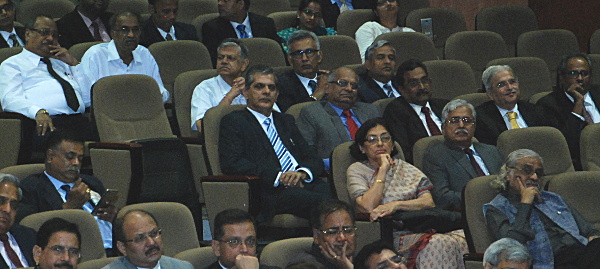
Distinguished members of the ITAT Bar Association, Mumbai, listening to the proceedings with rapt attention (click for larger image)
Honourable Law Minister-Mr. Ravisankar Prasad
Honourable Minister stated that, Modi Government aims to make India an economic power house, make India transparent, and help in doing business easily. He stated that Aadhar is a viable digital identity.
Essence of digital India is to empower India. It’s true power would be when even a woman in the rural area also has a phone in her hand. Digital technology is important and bridges the inequality. The technology should be affordable. He explained how the Aadhar is important.He showed his Aadhar card and explained the advantages of the Aadhar.
Honourable Minister has stated that a lot of industries are coming to India, hence tax litigation will also become very important. He stated that more assessees should come under tax net. He also stated that fast tracking of the cases should be done and is desirable from the ITAT. He stated that India has done well in indirect tax as well. No vote of dissent in deciding the rates of GST were seen and all will benefit from GST. He stated that Govt’s ambition is to make India a great economic powerhouse. Honourable Minster stated that surely the ITAT members and the lawyers will add and help in the process of making of India. He stated that considering the request made by Surat tax Bar Bench of ITAT, a Bench at Surat may be started very soon.
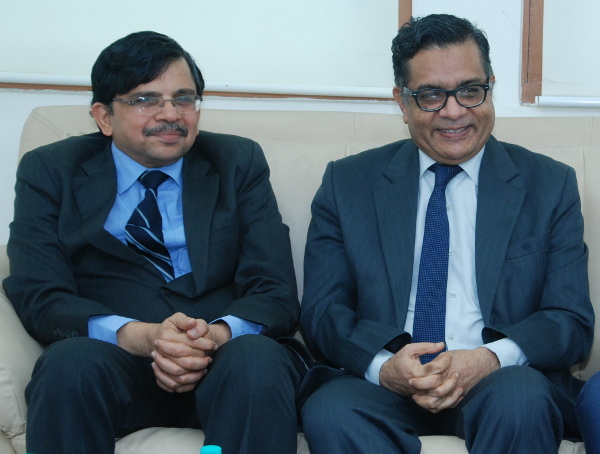
Justices S. Muralidhar and M. S. Sanklecha offered valuable insights on the justice delivery system
Honourable Mr. D. Manmohan, Vice President ITAT, proposed a vote of thanks
Technical Session
Expectation of stake holders
Honourable President, Shri G. D. Agarwal chaired the session and welcomed the representatives of the Bar Associations and members . He stated that mostly the delay in delivering the judgment is due to lengthy arguments especially where stakes are high. He requested for suggestions from the stake holders for quick disposal of matters.
Mrs. Arati Vissanji, President ITAT Bar Association Mumbai
On behalf of the Bar and on my own behalf I thank you for giving us this opportunity to voice our expectations from the Income Tax Appellate Tribunal. This open minded approach is an exceptional practice and deserves to be commended.
Our expectation can be summed up in a single sentence – An independent justice delivery system guided by the motto “Nishpaksh, Sulabh, SatwarNyay” I propose to share with you 3 points which in our view are likely impact our expectations.
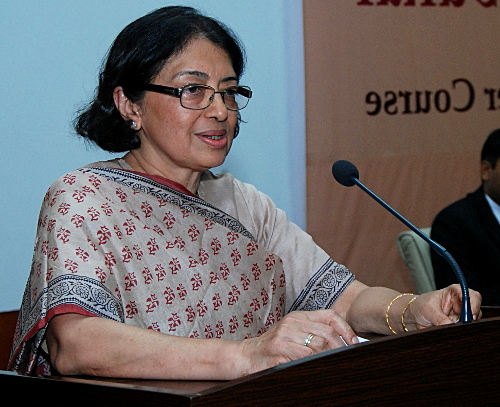
Ms Arati Vissanji, President, ITAT Bar Association, Mumbai, argues why the “quota system” should be dispensed with
From a modest beginning in the year 1941 the Tribunal has evolved into a model institution. Its contribution to the development of law and resolution of tax disputes can be measured by the fact that 82.5% of orders passed by the Tribunal have been affirmed by the High Courts.
Nevertheless, the passage of time has somewhat altered the structure and working of the Tribunal. No doubt there are positive changes,but we have diagnosed some changes which may have an effect on the future health of the Tribunal:
i) The first is the introduction of the quota system to reduce pendency -The current waiting time for an appeal to be heard and disposed of by the Tribunal has reduced from 6 years a decade ago to less than 2 years. Nevertheless, pendency remains a problem and to further reduce the gap between filing and disposal,a monthly quota of disposal has been prescribed. Two factors which we believe are contributory is the shortage of Members as well as the fact that increasingly complex issues which come up for consideration coupled with the rapidly developing tax law.
In our perception, the pressure caused by the disposal quota impacts both the proceedings in courtrooms and the quality of orders and therefore, may not be the most ideal way to tackle this problem. It is a matter of pride when the Hon’ble Judges of the High Court hearing appeals for admission are heard to say “the judgment of the Tribunal cannot be faulted with.”
We look forward to the time when the rate of orders passed by the Benches of the Tribunal being upheld by the higher Courts crosses 82.5%. At the same time, there are orders passed which are cryptic. Despite the conclusion being correct, the fate of such orders is a set aside and the appeals once heard get added to the pendency list. Second innings is a costly affair for an assessee in terms of time and monetary implications. The anxiety to meet targets could well be the cause.
Some alternatives which may be considered to deal with this problem – (a) posting of seasoned Members at stations with high revenue and complex cases (b) rationalization of Benches that is, the number of Benches at each station should match the need, that is, pendency of appeals. Excess Benches could be shifted to those stations where there is a shortage. This process should be appraised and monitored continuously (c) Recruitment process should be need based but posts should not be left vacant for long.
ii) Administration – Sufficient support staff and required infrastructure strengthens an institution. Vacancies in top positions weakens the institution. From past experience we can say that complete familiarity with the working of the institution and the persons manning the institution goes a long way to build the institution and this is possible if the practice of promotion from amongst the senior most Members is preserved. It is felt that the President must be selected from within the institution as an insider alone can feel the pulse of the institution. Benches of the Tribunal now exist across the country and there is an urgent need for the same level of uniformity and stability at every station.
iii) Recent amendments in the Act relating to the Tribunal may not be conducive to our expectations. Experienced Members are an asset to the institution. Tax laws are not simple, their complexity is increasing. New appointees must be allowed sufficient time to gain the experience needed to discern relevant facts and finer legal issues both in the course of the hearing and while disposing off a matter. Therefore, fixed tenure of 3 years for Members requires a relook.
The Mumbai Bar Association has been associated with the Tribunal for almost 60 years. The Bar has been an active supporter of this august institution and will continue to do so in future.
Mr. Ajay Wadhwa President ITAT Bar Association Delhi
“Satyamev Jayate” – Truth always triumphs.
This one phrase encapsulates the essence of the vision and ideals of the judicial system in India, the supremacy of law and the omnipotence of justice. In the words of Mahatma Gandhi “there is a higher court than courts of justice and that is the court of conscience”.
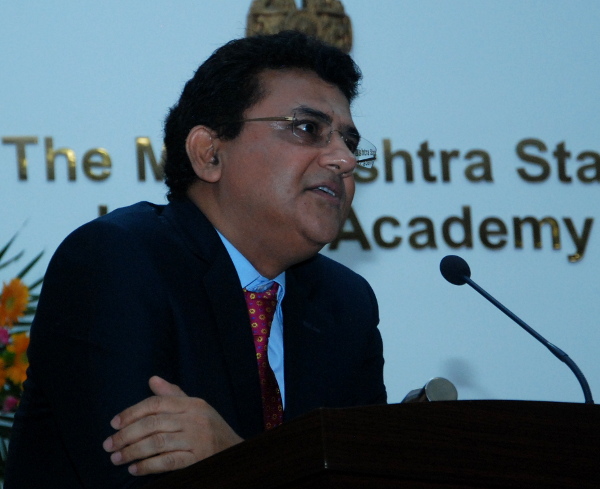
Shri Ajay Wadhwa, President, ITAT Bar Association, Delhi, argues that recruiting Members of the Tribunal on a fixed tenure basis will compromise the impartiality and the fairness of the ITAT
This is the expectation of every common man from not only the Income-tax Appellate Tribunal (Tribunal) but every institution dispensing justice.
On this touchstone, I say this,not only for myself but on behalf of all my colleagues in ITAT Bar Association, Delhi, whom I represent today,that this great and venerable institution, has upheld justice not only in its legal form but also as a concept of moral righteousness based on ethics, rationality, natural law, fairness, equality and equity.
More than 90% of the decisions delivered by the Tribunal have been upheld by the higher courts and it unequivocally enjoys the confidence of the Department and the tax paying public at large in its ability to deliver justice expeditiously, effectively and fairly.
But we all know that however perfect a system may be, there is always room for improvement and expectations are always from one, who has the ability to deliver.
In Delhi alone, there are more than 200 stay granted matters involving high stakes that are pending for many many months. I am aware of several cases where such matters are pending for even two years or more. It is elementary that in a stay granted matter, the assessee does not or rather cannot seek adjournment. It is the Department that generally takes adjournment on some pretext or the other. We, at the level of the Bar have made umpteen efforts by writing to the concerned officers in the Department and even meeting them on one to one basis to solve this imbroglio. We are disheartened to report that the efforts have borne no results and the stay granted matters continue to languish. It is a pity that, the blame for delay in disposal of such critical appeals unwittingly falls at the door of the Tribunal.
We now expect the Tribunal to takes these matters in its hands and propose a simple solution for your kind consideration.
To begin with, at least in all stay granted matters, whenever the Department or the assessee seeks an adjournment, an interim order with suitable terms and conditions should be passed by the Bench and uploaded on the website of the Tribunal on that very day. This would be in line with the practice being followed by the High Court and the Supreme Court in every case before it since many years. Also, whenever a final order in respect of a stay granted matter is passed, the order should incorporate as an annexure, particulars of when the hearings took place and the nature of adjournments sought by both, the Department as well as the assessee. This will hopefully present a strong tool in the hands of the supervisory officers to goad the Departmental Representatives into action.
The other expectation from the Tribunal is to try, as far as possible, not to set aside the matters. Setting aside the matter pushes a case into the vortex of a black hole only to emerge four years later as an identical avatar.
The ITAT is well within its powers to call for a remand report within a stipulated period and render complete and substantive justice. I am sure, the Department would also welcome this move since setting aside of mattersonly clogs the already overstretched machinery of the Department with no tangible results.
The third wish relates to settling debatable issues at the very earliest and providing certainty. There are 1414 transfer pricing and 1009 international tax related disputes pending before the Tribunal in Delhi alone. We find that particularly in these matters, decisions taken by one Division Bench are being differentiated and dissected by other Benches thereby leading to confusion and chaos.
Even otherwise, India being largely a common law nation the doctrine of stare decisis,has to and rather must prevail.
Our expectation from the Tribunal in the matter is that the decision of Division Bench must be followed unreservedly and the matter be left for the wisdom of a higher court to be the final arbiter.
Any difference in view must necessarily lead to a request for constitution of a Special Bench and all attempts should be made to settle the controversy expeditiously.
We expect to see the dream of paperless proceedings become a reality during the term of the current president of the Tribunal. I have, many at times seen Hon’ble Shri G.D. Agarwal become emotional seeing reams and reams of paper being wasted in Court proceedings.
Being the mother of all Tribunals in the Country, the ITAT must lead the way to use Information Technology to its hilt and move towards SMART TRIBUNALS.
Delhi today has an unenviable distinction of having the largest pendency at 21,670 cases in the country. May I plead for the constitution of another Bench in Delhi to alleviate this problem?
Finally, we wish and hope that the ITAT engages a professional spokesman for itself. There is nobody who carries the message of the yeoman service rendered by this great institution in the dispensation of fair, equitable and expeditious justice. We are appalled at the introduction of the new rules for recruitment of the Members of the Tribunals that are clearly reflective of the obvious disconnect between the institution and the powers that matter. Recruiting Members of the Tribunal on a fixed tenure basis will compromise the impartiality and the fairness of this great institution and will seriously erode its competence and faith of the tax paying public.
Institutions are built brick by brick over many many years.
We just hope and pray that the present dispensation does not go down in the annals of history as a bulldozer which destroyed this institution with a single stroke.
Finally, Hon’ble Law Secretary, an earnest appeal to your goodself; please have the President of the Tribunal from within the Institution.
Mr. Tushar Hemani, President of Income Tax Appellate Tribunal Bar Association, Ahmedabad
“Expectations of the stakeholders from the Income Tax Appellate Tribunal”.
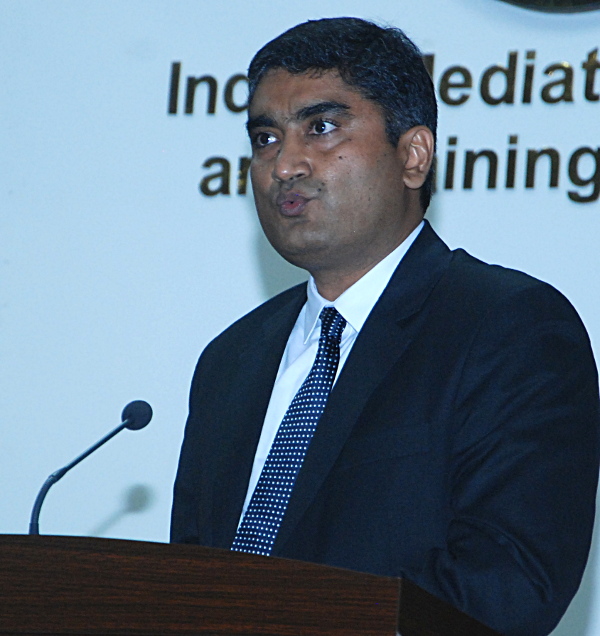
Shri Tushar Hemani, President, ITAT Bar Association, Ahmedabad, has argued that the posting of temporary Departmental Representatives (DRs) to argue complex and complicated matters should be avoided
• For the first time in the history of ITAT, such an interactive program has been arranged. I sincerely request Hon’ble President to make this an annual event so that we can have a healthy exchange of ideas and concerns about the institution we all love and respect.
• The ITAT was established in 1941 so as to impart ‘Nishpaksh Sulabh Satvar Nyay’which means impartial, easy and speedy justice for one and all.In 75 years of its existence, the ITAT has created a niche for itself by imparting inexpensive justice which is free from the hurdles of procedural technicalities. The specialized nature of the proceedings, expert judges and knowledgeable arguing parties have all contributed in the success story of the ITAT so much so that ITAT is referred to as the ‘Mother Tribunal’ in Indian judiciary.
• If past performance is an indication of the future to follow, the glorious past of the ITAT has certainly increased the expectations of the stakeholders. Even today also, the expectations of the stakeholders remain the same;
Impartial
Easy
Speedy and
Inexpensive Justice.
• However, the question for introspection would be: whether ITAT as an institution can be said to be meeting with these expectations? In my opinion, ITAT even today also imparts impartial, easy and inexpensive justice. However, it is the speed of justice which has raised some serious questions.
• Expectations and Suggestions are two sides of a coin. My learned predecessor speakers from sister Associations have already discussed at length the relevant issues and expectations therefore I don’t propose to repeat and reiterate the same.I simply adopt, support and endorse their views on those issues and expectations. My endeavor now would be to discuss the way forward so as to fulfill the expectations of all the stakeholders.
• No judicial system in the world is perfect. Ours is not an exception. The major problem that we all face today is the speed of Justice. The average turnaround time for an appeal before the Tribunal is more than 3 years. If I have to pinpoint one reason for this delayed justice, it would probably be the infrastructure facility or lack thereof.
• Infrastructure is one major speed breaker in delivering justice. Numbers of appeals and complexities involved in such appeals have increased manifold. However, the infrastructure of the Courts, numbers of judges and support and back office staff have not increased in the same proportion. This has created tremendous load on the existing system and resultantly, the speed of delivering justice has suffered. Issues relating to number of judge,support and back office staff have already been dealt with my predecessor speaker, so my suggestions would be with respect to improving the physical and technological infrastructure. Some of the suggestions would be:
o to establish world class infrastructure facilitiesand use of technology inside and outside the Courts to speed up the delivery of justice. Technology brings transparency with certainty. To begin with, we can have computers with efficient operators in the court rooms so that dates of hearing, order sheets, clubbing and consolidation, tagging and fixing of appeals can happen instantly.
o to establishmore e-courts so that standalone benches having huge establishment and running costs can be avoided. Moreover, e-court can be conducted from large Stations having multiple members and requisite infrastructure at no additional cost. Additionally, clubbing, tagging and consolidation based on the issues involved in the appeals can be done over many Benches.
o to make an interactive and user friendly website of ITAT which takes care of e-filing of various appeals and applications in soft forms, automatic clubbing and grouping of appeals, automatic generation of notices of hearing, uploading of paper book, integration of order sheet entries with the appeals, service of orders in electronic form etc. Moreover, decisionsshould also be displayed and highlighted so that issues already decided by one bench can be used at other stations for speedy disposal of pending appeals involving similar issues.
o to group and tag the pending appeals for the issues involved therein so that multiple appeals can be decided by deciding one issue.
o to identify repetitive and multi-year appeals so that the same can be given priority hearing to avoid future appeals.
o to identify issues pending before the lower authorities and decide them proactively and on priority basis so that such pending matters before the lower authorities can be uniformly decided in line with decision of the Tribunal;
o to invite law interns from reputed institutions to help judges cope up with research and preparations.
• Apart from infrastructure, if I have to highlight one more factor affecting the speed of justice, then the same would be the practice of posting temporary Departmental Representatives (DRs) to argue complex and complicated matters. I am conscious that I have to state my expectations from Tribunal. However, Tribunal as an institution runs on three wheels viz. Assessee, Department and Judges. If one of the wheels works less efficiently, the overall speed gets affected. And in any case, as one of the stakeholders, I am sure Department would take these suggestions positively and would try to find a solution in the larger interest of the Institution. Appeals involving International Tax and Transfer Pricing require specialized and permanent DRs for effective hearing. In absence of such dedicated permanent expert persons, adjournment culture blooms. Many a times, DRs are instructed not to proceed with International Tax and Transfer Pricing appeals unless they receive written submissions from TPO which also results into hearings getting postponed. My suggestion would be to discontinue the practice of posting visiting DRs for arguing complex appeals. Moreover, if permanent DRs having the requisite knowledge of International Tax and Transfer Pricing issues are posted at ITAT, the need for written submissions from TPO will also recede. That apart, even private professionals, after empanelment, can be appointed for arguing departmental appeals, which in the long run would benefit all the stakeholders.
• Expectations can someday be fulfilled provided one knows what they are. Now that the Tribunal has taken this initiative of getting to know the expectations of the stakeholders, I am very sure that very soon the same shall be fulfilled. I once again thank Hon’ble President ITAT, Shri G D Agrawal for inviting me to address this august gathering and hope to see more such events in times to come.
Shri Sushil Chandra Chairman CBDT
It is for the first time CBDT is called as a stake holder and is requested to express their expectation. The pendency is 92,000 and revenue involved may be of 3 lakh crore. He stated that CBDT has great expectations from the ITAT. Some of them are as under
• It will have to pave way for speedy justice. .
• The department is equally a partner as the assessee. The CIT DRs should be given equal treatment. It was reported that such is not the case.
• Only those cases should be kept on the board which would be disposed of.
• ITAT is the Supreme Court for facts hence the ITAT has an onerous task of finding out the facts correctly.
– Our duty is to see that the interest of revenue should also be protected.
-The whole picture should be seen by the members before deciding the issue.
– Miscarriage of justice should not be done. Procedure should not be seen but the substantive justice should be seen.
• In the area of International tax, ITAT has rendered very good judgements.
• No temporary Departmental Representatives shall be appointed from this year and all postings have been filled.
Dr . K. Shivaram Sr. Advocate
We have few suggestions to Honourable Chairman CBDT and Honourable Law Secretary.
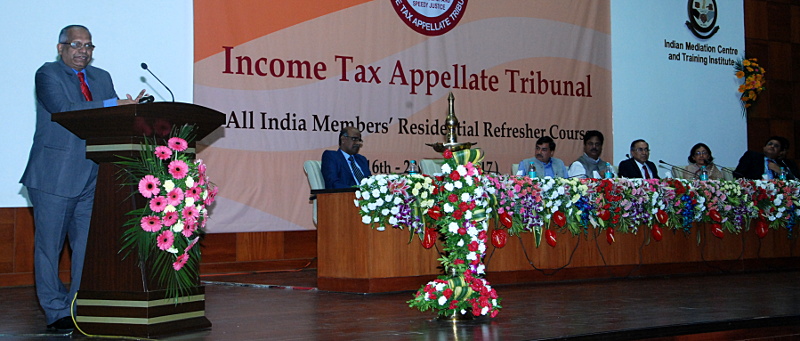
Dr . K. Shivaram Sr. Advocate, warns that the Department has no means to monitor whether the higher appellate orders in their favour are given effect to
1. Order giving effect to the order of the Apex Court and High Courts
From the reported cases, one will find that whenever the Apex Court or High Court has directed the Tribunal to refer the questions of law to High Court, to the best of our knowledge, no action has been taken by the revenue in most of the cases . The reason being that unless the revenue makes the application, the Tribunal cannot take up the reference suo-moto to refer the matter to the High Court. This must have resulted in to crores of rupees loss to the revenue. Even today when High Court reverses the order of the Tribunal and directs the Tribunal to decide according to law, unless the revenue moves the application before the Tribunal to taken up the matter, the Tribunal will not be able to take up the matter suo-moto. There has to be some mechanism to find out the status of such matters.
2. Orders of the High Court accepted by the revenue
Earlier Board used to publish the list of judgments accepted by the revenue. Now it is not published. A year back in one of the matters relating to transfer pricing, revenue argued a matter and the same was admitted. In another matter, identical issue was argued without pointing out the earlier admitted matter and the matter was dismissed by passing detailed order. The said decision was accepted by the revenue. In another matter, once again the revenue wanted to argue, when the counsel brought all the facts. The Court directed the revenue to develop a system where by such things may not happen. ASG appeared, Chief Commissioner was called and the revenue has agreed that, they will post all the issues admitted and dismissed and accepted in the website of Income Tax Department under the head Legal corner. Thereafter the Court passed the order in the case of CIT v TCL India Holdings Pvt. Ltd. (2016) 241 Taxman 138 (Bom.)(HC) on 12-07 2016. Unfortunately no steps have been taken. Whatever they have prepared for showing to the Court the same status prevails even today. There are instances where the revenue has not challenged the Special Bench matters and the judgment relying on the Special Bench was challenged. Pick and chose method is adopted.
He suggested that if CBDT can develop a system wherein all the questions admitted and dismissed and orders accepted are published in the website it will help the assesses as well as revenue.
Suggestions to Honourable Law Secretary
E-Benches of the Supreme Court
We have made an appeal to have e-Bench of the Supreme Court linking all the High Courts, so that a lawyer sitting at Gauhati can represent the matter before Supreme Court. This is the model of the e Bench of the Tribunal which was stated few years back, is functioning very satisfactorily . To start with, only SLP relating to tax matters can be taken up at the option of the assesses. If it works well it can be tried to other matters as well.
Single Member Bench up to 50 lakhs assessed income
In cases of penalty or interest even if the amount is only 25000, the matters have to be heard by division Bench, if the assessed income is more than 50 lakhs. If an amendment is made in the Act, giving the power to SMC Benches to dispose penalty or interest matter up to certain limit, it may help speedy disposal of the appeal matters.
Mr.Sumermal Surana, President of ITAT Bar association Kolkata
-Unnecessary appeals by the department may be be avoided.
– There has to be posting of regular departmental representatives in all the Benches.
Nilesh Vikamsey, President of the Institute of Chartered Accountants of India
He appreciated the Residential Refresher course organized by the ITAT. He stated that the institute of Chartered Accountants of India will play a positive role in the administration of justice delivery systems by sending suggestions from time to time.
In response to the suggestions made by various speakers, Mr. G.D.Agarwal, President of the ITAT, stated as under:
Suggestions can be divided into two categories, Judicial and Administrative.
As regards administrative suggestions, the monthly quota should not be there, it is true but disposal is also important without deterioration of quality.
The next suggestion is that, the number of Benches should be increased where there is large pendency.
For filling the vacancy, all efforts are being made.
There should be rationalization in posting the members in a bigger station.
Stay granted matters-delay in disposal. We should find out some ways. One solution could be to file the synopsis or written submission which may help quick disposal of matters.
Fixing large number of appeals. General direction is to fix 20 to 25 appeals. Still 30 to 35 matters come on board due to adjournments etc. Only 6 appeals in a day are expected to be disposed of . However, attempts are being made to make it to 15 disposals a day.
Shri Sushil Chandra, Chairman of CBDT, stated that they have the list of matters which are accepted by the Board and he will consider the suggestions of Dr. K. Shivaram very positively.
Shri Suresh Chandra, Honourable Law Secretary stated that he has taken note of the various suggestions made by the various speakers. As regards the suggestions made by Dr. K. Shivaram, regarding linking of various High Courts and Supreme Court and to follow the model of E .Benches of the ITAT, he has stated that , he will discuss the same with the Honourable Law Minister.
Shri D.Manmohan Vice President proposed vote of thanks.
In the technical sessions various subjects of importance including international taxation was discussed by eminent professionals,retired members and the Judges
Valedictory session on 23 rd July 2027 was addressed by Honourable Shri Justice .M. S. Sanklecha and Honourable Justice Dr. S. Muralidhar
Disclaimer.
Gist of the proceedings are prepared by the research team of AIFTP, Journal committee, for the benefit and education of the professionals who could not attend the Conference. Any error or omission if any, in the reporting of the proceedings is not intentional, neither the committee members nor the AIFTP or ITAT Bar Association or itatonline.org can be held responsible for the same.
Editorial Board, AIFTP Journal.
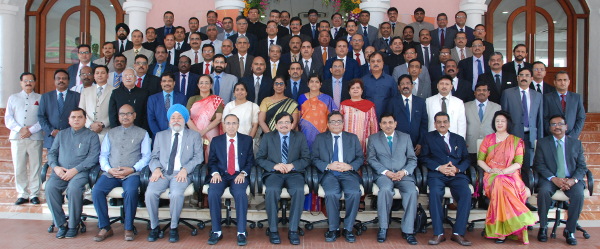
[…] the Hon’ble Union Minister of Law & Justice, readily accepted the said request at the ITAT Members Residential Refresher Course which was held from 16th to 23rd July […]